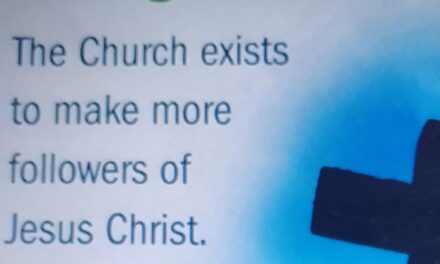The trial of Jesus before Pilate (a symbol of human institution) in our reading last Sunday revolves around the charge of treason. The chief priests tell Pilate: This man forbids us to give tribute to Caesar and says that He Himself is a king, hence Pilate asked Jesus the central question on the charge of kingship, “Art thou the king of the Jews?” (Jn 18:33-37). Jesus’ response affirms His unchanging message and truth to a changing political kingship. Her Majesty the Queen in her speech delivered in her absence by the Earl of Wessex before the Opening Session of the 11th General Synod, the Church of England reminds the church of the unchanging Gospel of the Unchanging Christ. According to Her Majesty, “None of us can slow the passage of time; and while we often focus on all that has changed in the intervening years, much remains unchanged, including the Gospel of Christ and his teachings.”[1] Truly, the society has changed and still changing ‘more technological, following the industrial revolution and the World Wars of the 20th century…,’ however, the Gospel of Christ and His teachings much remains unchanged (Heb 13:8). Any human efforts to update the Gospel to suit public life amounts to error and put Jesus on trial again.
The narrative from John’s Gospel reading reveals that ‘Jesus’ kingship becomes most visible in his crucifixion. It is as if his crucifixion is his enthronement as king, the moment at which the declaration of his kingship is made public.’[2] The missional reality of Jesus’ unchanging kingship and Gospel are expressed in His trials and crucifixion rather than in political dominance and control. Many today are in denial of Jesus’ unchanging kingship and Gospel, hence they are finding it very difficult to accept Jesus’ kingship, His Gospel and teachings because it counters their allegiances and partnership with the earthly powers and ideologies. Among the trials of Jesus going on today is not only rejecting Him as the unchanging king with unchanging Gospel, it is about changing the unchanging Gospel on the altar of compromise to suit the changing culture and society.
The pagan world with ‘a supermarket of beliefs… the growth of a new irrationalism’ is increasingly promoting Jesus’ trials through ignorance, indifference, pride, and prejudice.[3] Jesus is on trial in society where Christianity has become marginal. According to Alan Gilbert in his book ‘The Making of Post-Christian Britain’ published in 1980, such a society is ‘where to be irreligious is to be normal, where to think and act in secular terms is to be conventional.’ We put Jesus on trial again through hardness of heart, leave ‘God not for other gods …but for no god,’ and when we set aside the commandments of God in order to keep our human tradition (Mk 7:6-9). We put Jesus on trial when Christianity ceased to be the missional source of moral, theological and social criticism thereby trading Jesus for Barnabas; Jesus for Caesar. We put Jesus on trial today when we say no to Him as the ONLY Saviour (Jn 3:16). We put Jesus to trial when we reject the rule of God in our lives and join with the crowd that says “take him away. Crucify Him.” We put Jesus on trial everyday through our selfishness, pride and failure to tell others about Him. We put Jesus on trial when we are disobedient to parents and being ungrateful. We put Jesus on trial when we are unloving, unforgiving, slandering others and have no self control (2Tim 3:1-5). We put Jesus on trial when the Pilate in each of us try to please the crowd at the expense of Jesus, the unchanging King. We put Jesus on trial through fake smile, just as Judas greeted Jesus in the garden. We put Jesus to trail when we twist His actual words (Mk 14:55-58). Jesus is put to trial when we interpret the darkness of earthly life as evidence of God’s lack of love for us. We put Jesus on trial when we allow the trials, hardship, and persecution for our faith in Him, hunger, lack of clothing or shelter, physical threats, or death by violence to separate us for His love (Rom 3).
Jesus’ unchanging kingship and Gospel were enacted against the protests of the Jewish leaders. The truth is that, no human or institutional protest or update can change Jesus’ unchanging kingship and Gospel. The crucifixion makes clear, Jesus’ kingship is “not of this world” (John 18:36). We all know that worldly leaders and kings take power from others by winning elections, battles or at least through successful diplomacy or violence. Jesus, the unchanging King with the unchanging Gospel points to Jesus’ testimony to the truth against the united errors of the chief priests.
Jesus’ birth and death testifies to His true identity as the unchanging King with His unchanging Gospel of salvation (Jn 3:16). Jesus offers an alternative to earthly kingship: “I have been born and come into the world for this: to witness to the truth” (John 18:38). For Jesus, it is gracious and better to be hated for telling the truth than to be loved for telling a lie. It is also better to stand alone with the truth of the unchanging Gospel than to be wrong with a changing multitude. Jesus’ witness to the truth heals and sets the captives free.
Jesus, the unchanging King with His unchanging Gospel reveals to us different characters responsible to Jesus’ death beyond Judas Iscariot. The Greek translation to “betray” described not only ‘the actions of the Jews and Pilate,’ but others who are rejecting the Kingship of Jesus today. Just as Jews handed over Jesus to Pilate, “hands Jesus over” to be crucified, the Pilates in each of us continue to put Jesus on trial (Jn 18:35; 19:16). The reflection is that ‘the culpability in Jesus’ death does not rest with Pilate or Judas alone but is shared through’ our actions, inactions of betrayal or handing over. Indeed, Pilate makes it very clear that the greatest oppositions and trials facing Jesus and His teachings comes from His followers. Pilate in His reply to Jesus said, “Am I a Jew? … Your own people and chief priests handed you over to me. What is it you have done?” To the disappointment of Pilate, Jesus replied that His purpose is not to take over the world’s system. Jesus’ unchanging kingship and Gospel are matters of “righteousness, peace, and joy in the Holy Ghost” (Rom 14:17). These are all inner spiritual qualities that affect outward attitudes and actions.
Jesus, the unchanging King with His unchanging Gospel of the Cross points to how Jesus on His own accord “gave up … hands over” His spirit mainly “to witness to the truth” (Jn 19:30; 18:37). An essential part of Jesus’ mission on earth was to testify to the truth of salvation and point people to it. The truth include the fact that Jesus is God in human form and that He came to bring spiritual salvation by restoring people’s opportunity for a relationship with God. We put Jesus on trial again when as His followers we compromise and make this truth hard to see when we practice and encourage false teaching, tolerate unbiblical behaviour, engage in meaningless arguments and attempt to please people with our message. We put Jesus on trial again by refusing to teach the clear difference between right and wrong, truth and error. Jesus, the unchanging King with the unchanging Gospel of the truth reminds us that it is Jesus and Him alone who ‘exerts authority over life and death’ and not Judas, the Jews, or Pilate’ or any human institutions. Jesus power is super unchanging power through His unchanging Gospel.
John’s trial narrative raises more questions in
compelling ways. The Pilates in each of us may appear to be powerful, John
presents Jesus as the one who exercises authority. The quests by human
institutions about Jesus’ identity continue to show the faithlessness of those
who reject Jesus. The trial continues today just as the Gospel reading uses the
trial and crucifixion to display Jesus’ kingship. Jesus, the unchanging King suggest
a kingdom “not from here” thereby witnessing to the truth that Jesus is a king.
Beloved, rejection of the truth is costly. Rejection of truth can cost a church
its growth and existence. Dedication to Christ’s truth brings life, growth, and
sets us free. The truth of Jesus Christ will
outlast every lie this world could update or tell.
[1] https://www.royal.uk/queens-message-opening-session-11th-general-synod
[2] https://www.workingpreacher.org/commentaries/revised-common-lectionary/christ-the-king-2/commentary-on-john-1833-37-3
[3] Beasley-Murray, Paul, Reaching Secular People (London: British Church Growth Association, 1991), p. 5











Recent Comments